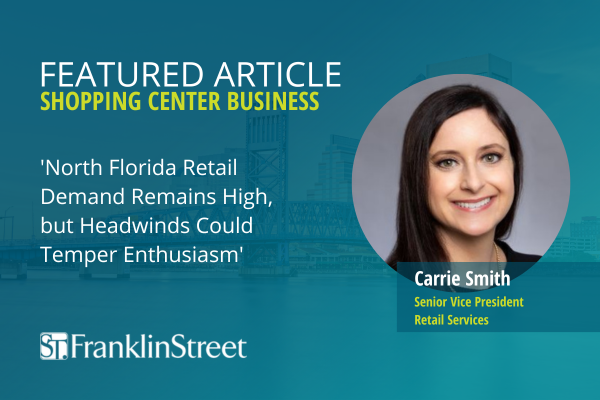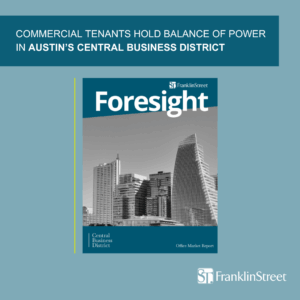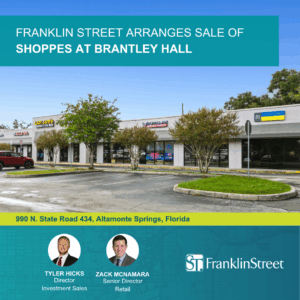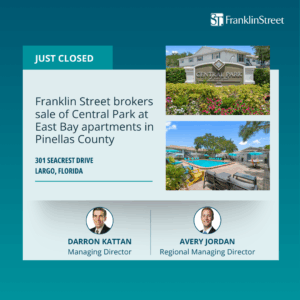North Florida has been a hotbed of retail activity that hasn’t shown signs of slowing, according to Carrie Smith, senior vice president of retail at Franklin Street in Jacksonville, Fla.
“Retail is nothing short of being red hot,” she says. “It’s probably in the most aggressive dealmaking mode since I’ve been in business. The deal flow is very high, and it’s hard to keep up.”
Jacksonville boasts low vacancy rates, in part due to its rapid population growth throughout 2022. According to Franklin Street’s latest data, Jacksonville saw deliveries of over 600,000 square feet of retail in the fourth quarter of last year, with no difficulties in absorbing this supply.
“There is not a lot of product,” Smith says. “Finding space is more challenging than it’s ever been.”
Even with the active pipeline growing the area’s retail inventory by 1.1 percent, supply additions remain below the metro’s historical average. This, Smith notes, has forced retailers to get creative if they want to secure a space.
“They’re having to compromise on certain attributes,” she says. “If they want five or six things, they’re going for it if a space checks three boxes.”
Smith notes there’s not much that landlords need to do to entice tenants as long as the center is in an area with a good traffic count, solid population base and decent income. However, the market is so favorable right now that even these attributes aren’t necessarily requirements.
“In that case, the name of the game is selling on the future,” Smith continues. “I don’t believe much is a hard sell these days.”
A Landlord’s Market
Smith notes North Florida landlords have been in the driver’s seat since COVID as demand continues to increase while the region’s supply can’t keep up. Many landlords are demanding annual rent escalations due to inflation. They’re also more obstinate about avoiding exclusivities, co-tenancy and kick-out clauses.
“These are issues that are typically massaged and negotiated on both sides, but it isn’t happening today,” Smith says.
The area is so popular with retailers that many are even signing leases two to three years in the future.
“It’s unlike anything I’ve ever seen,” Smith continues. “A space will be coming available in 2025 and the landlord is doing another deal before that tenant is even out.”
Though many retail categories (and companies) are looking for space, the most active in North Florida include fitness, discounters, service-oriented tenants and fast food and fast-casual restaurants. Smith cites Five Below, Dollar Tree, Planet Fitness, Crunch and Orangetheory Fitness as some of the most active and aggressive in the market. Great Clips, Quest Diagnostics and the UPS Store are also expanding rapidly.
In the food space, Chipotle, Panda Express, McDonald’s and Chick-fil-A are increasing their presence.
“Just when you think restaurants have got enough locations, you see another one open,” Smith says. “You can’t keep up with some of these food service players. They have an insatiable appetite for deals.”
The area’s retail market is doing so well that a few big and junior box players are coming out of the woodwork.
“Target and BJ’s Wholesale Club are doing multiple deals in the Southeast,” she continues. “We hadn’t heard from them in a while, and now we’re seeing site plans throughout Florida and Georgia. Lowe’s is also doing a handful of deals.”
A Landlord’s Challenge
It may seem like landlords in North Florida are on easy street and, in some ways, they are. But things change, as any real estate player knows, and landlords aren’t immune to this new environment.
“There are lots of headwinds we’ve been facing post-COVID,” Smith adds. “I don’t think we’ve truly realized, as an industry, that some of these headwinds are going to potentially bring us to some sort of slowdown.”
Construction costs are one example. Smith notes we haven’t seen the full effect of these increases as the current projects got off the ground about a year ago. Renovations have also been impacted, as landlords are now hesitant to make any big moves with interest rates as high as they are.
“We’re seeing landlords take a wait-and-see approach when it comes to any projects that hadn’t already gotten well underway by the end of last year,” she says. “Several new developments were put on hold — and they’ll stay there — until landlords see what shakes out by the end of this year. They also won’t be spending money on renovations or updates until then.”
The problem is justifying the cost of capital as rents approach a ceiling.
“The rent factor is getting to a place that’s seemingly uncomfortable,” Smith continues. “You’ve got retailers paying easily $40 to $50 per square foot. At some point, you’re probably crossing a line where the occupancy cost is not comfortable.”
The idea of a recession is also problematic.
“Even if you achieve that rent, if you build during a recession and that tenant falls out, you won’t likely achieve the same rent easily again,” she explains. “We’ve certainly learned some lessons from the last recession, and that includes knowing when to pull back.”
Lenders learned some lessons from the last recession as well.
“I’ve talked to certain developers who have said the terms and conditions they’ve become so accustomed to aren’t the same today,” Smith says. “This is even true for lenders they’ve worked with for decades. It makes the economics they’ve come to depend upon non-existent. Reality has become very different when you put pen to paper.”
Still, for all the worries, current North Florida landlords are sitting pretty. They can continue to do so, Smith believes, as long as they don’t stick their heads in the sand and as long as they continue to feel which direction the wind is blowing.




